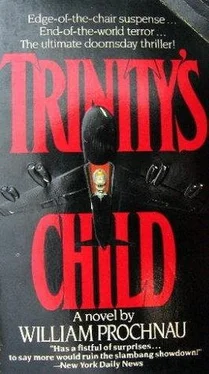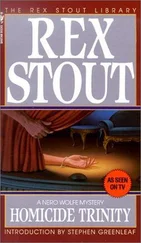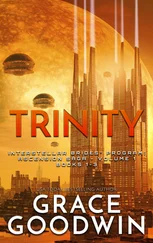At the trailhead, where a rusted old Ford pickup sat hugging the bank of the South Fork of the Coos, the boy shoved his old man into the passenger side and gunned the ancient truck backward up the rutted hard pan of the river road onto the highway. Had someone been watching, all he would have seen was the giant figure of a man propped against the passenger door and two intent cow-brown eyes framed inside the steering wheel as the battered Ford clattered fifteen twisting miles into the town of Coos Bay. Kazaklis bumped it down the main drag of the port town, past the penny parking meters and the drunks lying in the rain, past the whorehouses and the chug-a-tugs with their flotillas of raw logs, past the Sportsmen’s garish neon and the freighters stuffed with Yankee wood for Japanese mills, and on up the road to the hospital.
Big Kazaklis piled out first. He lumbered, ghost-faced, through the hospital doors, and stopped, bear of a man, legs parted for much-needed balance, one leg being faded-jeans blue and the other cranberry red. He ripped a soaked three-bandanna tourniquet off and waved it once at a dumbstruck nurse.
“M’ boy got hisself his first buck!” the old man thundered. “Hope he’s better at huntin’ poon.”
Then he rasp-roared a laugh and keeled over flat on his face. Moments later, the boy looked up at the new figure towering over him and, no flinch at all in his eyes or his voice, said: “Had it comin’, old bastard.”
The deputy sat through the afternoon and then the night with the boy, the kid not saying another word, not sleeping a wink, either. In the morning, when the doctor came out and said the old coot was making it, three pints of blood being what he lost, Kazaklis stood up and marched down to see him, the deputy following, instead of vice versa.
“What the kid tell ya?” Big Kazaklis grunted at the deputy.
“Told ’im ya had it comin’, ya old bastard,” the boy interrupted. He stood, arms folded over his chest, staring down at Big Kazaklis with eyes neither sorry nor hateful. Just certain.
“Didja, now, bub?”
“Yep.”
For a full minute the deputy watched the two of them stare at each other. The coast mountains had seen three generations of these men, four if you counted the young one coming up. Nothing changed in them, except the Greek. The Greek seemed to wash out generation by generation, diluted by a string of young blond wives who washed out, too, turning fifty before they turned thirty. One boy to a generation, no girls and no brothers, as if that was all the Kazaklis women could find the soul and the source to deliver up. And maybe it was. The deputy was glad he didn’t have a blond daughter. Damned glad.
The kid kept on staring at his old man, feeling the tears well up again, and the anger flare, too, because Big Kazakhs stared back with a half-smile. His old man could see through him, and he hated it, so he willed the tears away and jutted his chin out at him instead. Nobody was going to see him cry. Ever.
Big Kazakhs came home on the same kind of day he left, the mist oozing out of the roof moss atop the weather-beaten house a dozen miles up the Coos, the escalating rain just beginning to overwhelm the moss like a soaked sponge and drain, plop-plop, down from unpainted eaves. He stood in the doorway, braced powerfully on a cane that looked more like a weapon than a crutch.
“Well, bub, think yer grown up ’nuf fer the rest? Huh, bub, huh? Tell yer ma you ’n me got some business t’do. Tell ’er to run into town and see ’er folks. Then head upstairs. Man.”
In the noontime murk of his room the boy did not wait long. Nor was he surprised when Nikko, the raven lady from the Sportsmen’s card room, entered. Nor when the talons of her shellacked fingernails picked quickly away at the buttons of her silken black shirt, exposing the hint of apricot breasts in the shadows; nor when the talons advanced to the Levi Strauss buttons of his jeans; nor when they scampered farther. It was part of a ritual never described, poon, but always sensed. The surprise came when the talons did not advance to the faded Pendleton plaid of his shirt, did not advance to the zipped hinges of the raven lady’s clinging black trousers. The surprise came, as it had in the woods, as it had when the buck fell suddenly, when Nikko descended suddenly, too, her clothed body matching his clothed body, her nudity his nudity, but not matching at all.
“It’s wrong!” he shrieked in dismay, pounding tight fists into the back of black-clad hips swaying unused in front of him.
“Not long,” the singsong canary voice cooed, pausing just briefly in her chore. “Big Kazakhs say not long first time.”
Then, in the spurt of his half-lost virginity, it didn’t feel that wrong. But it did. There was no warmth to it, no more warmth than there was along the Coos.
Over the next years, as the boy learned far, far more about the mysteries of poon, he stood regularly at the window of the Sportsmen’s Club, nose pressed steamily to the glass as he watched Big Kazakhs in the metallic blue light of the card room, one gnarled hand on red Bicycles flicked to him by Nikko’s talons, one gnarled hand wrapped around an Oly, the beer hand occasionally slipping around the felt-covered table to grasp a slender raven’s thigh. And he felt failed—gypped, too—as he had in the woods. He also knew he had to leave this place.
The old man took a long time seeing that the bout with the buck, and the bout with Nikko, too, were truly bad mistakes. But the time came, maybe a year later, when he finally got the boy back out into the once-magical woods. It was a day when the heavens opened and the water poured out of the sky, as the old man put it, like the gods was drinkin’ beer and peein’ on ’em.
The kid looked up at his pa through the peek hole of an ancient and oversized poncho, November rain flooding down its green rubber sides. He wore sullenness in his eyes, though the old man could only sense it, not see it through the sheets of icy water cascading out of the bleak sky and tumbling down the limbs of the giant tree they used for partial shelter.
“Need ourselves a fire, bub, that’s what we need, huh, bub, huh?”
The kid’s cow-brown eyes reverted to their ancestral black. His boots were filled with ice water. He was soaked down to his Fruit of the Loom. He looked about him, and all he could see, as far as the eye reached in the gloom, was wetness. They stood in a rainforest hollow. The shadowy hulk of giant trees lay rotting, their backs grotesquely broken where they had fallen decades ago. It was a dismal swamp, the kind of place in which he had floated through those childhood fantasies until he had been broken of all their allure. He said nothing. To make a fire here was to spark flints in a rain barrel.
“Come ‘ere, bub,” the old man said, pulling the kid toward the decayed body of a fallen fir wider than the boy was tall. His knobby fingers dug into the wet crud, sending giant beetles scrambling, grabbing one with a deadly pinch and thrusting it toward the boy. “Bear food. Kid food, too, if’n ya needs it.” Then he dug further into the flaky corpse of the tree, prying out a glob of sticky amber-colored pitch.
The old man molded the pitch, planted it in a scooped-out trough beneath their shelter tree, and surrounded it with soaked fir needles. With one match the pitch snapped magically into flame, the needles steaming for a second and then crackling too. Expertly, Big Kazakhs added drenched twigs, then wet sticks, and finally soaked logs, the flames from one layer sapping the water out of the next. In a moment the boy was warm, in twenty minutes dry, even with the rain still pelting his poncho.
“That big rottin’ tree’s always gonna be there, bub, with pitch to keep you warm and bugs to keep your stomach full, if’n ya needs ’em. Remember that. Some things is eee-temal, always there for ya, like the mountains.”
Читать дальше












